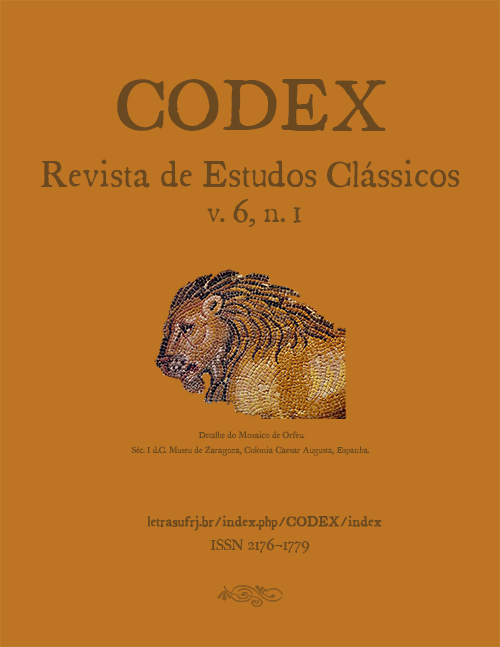A translation of the poem Moretum into Portuguese hexameters
DOI:
https://doi.org/10.25187/codex.v6i1.12249Keywords:
Appendix Vergiliana, Vergil, Ovid, MoretumAbstract
Recent scholarship on the pseudo-Virgilian Moretum has discussed more than its authorship. Nowadays, it focuses instead on the poem's intertextual relationships with other classical texts. This paper aims to offer a general view of these recent studies, addressing some possible interpretations for the interrelationships between the Moretum and authors such as Vergil and Ovid. It enumerates a few common features of the Appendix Vergiliana poem and Vergil's works and compares other characteristics to a theoxenia scene in Ovid. At the end we present the Latin text, discuss some of its corrupt passages and give a translation of the poem into Portuguese. In this translation, we use the so-called “hexameter in Portuguese” model, which tries to emulate the rhythm of the Latin hexameters through the contrast between stressed and unstressed syllables in Portuguese.References
CHOLMELEY, R. J. (ed.). Theocritus. Idylls. London: George Bell & Sons, 1909.
CLAUSEN, W. V. et al. Appendix Vergiliana. Oxford: Oxford University Press, 1966.
ELLIS, R. A Bodleian Ms. of Copa, Moretum, and other poems of the Appendix Vergiliana. London: Henry Frowde, 1906.
FAIRCLOUGH, H. R. (trad.). Virgil. Vol. II: Aeneid Books 7-12; Appendix Vergiliana. Cambridge: Loeb Classical Library, 1918.
GONÇALVES, R. “Tradução e ritmo: rêver le vers de Lucrécio”, in: Morus - Utopia e Renascimento, Campinas, v. 11, n. 1, 2016, pp. 181-197.
HALPERIN, D. M. Before Pastoral: Theocritus and the Ancient tradition of Bucolic poetry. West Hanover: Yale University, 1983.
HORSFALL, N. “The Moretum decomposed”, in: Classica et Mediaevalia, v. 52, 2001, pp. 303-15.
HÖSCHELE, R. “Moreto-Poetik: das Moretum als intertextuelles Mischgericht”, in: HOLZBERG, N. (ed.). Die “Appendix Vergiliana”: Pseudepigraphen im literarischen Kontext. Classica Moncensia, 30. Tübingen: Gunter Narr Verlag, 2005, pp. 244-269.
KENNEY, E. J. The Ploughman's Lunch, Moretum: a poem ascribed to Virgil. Bristol: Bristol Classical Press, 1984.
LAUDANI, C. Moretum. Nápoles: Loffredo Editore, 2004.
PEIRANO, I. “Constructing the young Virgil: the Catalepton as pseudepigraphic literature”, in: ______. The Rhetoric of the Roman fake: Latin Pseudepigrapha in Context. Cambridge: Cambridge University Press, 2012.
PERUTELLI, A. VIRGÍLIO. Moretum. Pisa: Giardini Editori e Stampatori, 1983.
RAND, E. K. “Young Virgil's Poetry”, in: Harvard Studies in Classical Philology, Massachusetts, v. 30, 1919, pp. 103-185.
RIBBECK, O. P. “Vergili Maronis Opera”, vol. 4, in: Appendix Vergiliana. Leipzig: Teubner, 1868.
RIBBECK, O. P. “Vergili Maronis Opera”, vol. 4, in: Appendix Vergiliana. Leipzig: Teubner, 1895.
SALVATORE, A. Appendix Vergiliana. Vol. 2. Aug. Taurinorum: In aedibus I. B. Paraviae, [1960].
SALVATORE, A. et al. Appendix Vergiliana. Roma: Typis Officinae Polygraphicae, 1997.
Downloads
Additional Files
Published
How to Cite
Issue
Section
License
This work is licensed under a Creative Commons Attribution-NonCommercial 4.0 International License.










